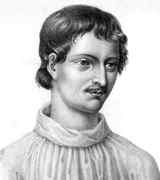Person: Bruno, Giordano

Giordano Bruno was an Italian philosopher of science who was eventually burnt in Rome as a heretic.
Mathematical Profile (Excerpt):
- Only at the age of 17 when he entered the Dominican convent of San Domenico Maggiore in Naples, where Thomas Aquinas had taught, did Filippo take the name Giordano.
- Bruno left his home town of Nola to travel to nearby Naples when he was 14 years old to study there.
- We shall see as we relate the story of Bruno's life how he continued to be influenced by the ideas of Averroism.
- After his studies in Naples, Bruno entered the Dominican convent of San Domenico Maggiore in 1565 taking at this time the name Giordano.
- Never one to accept what he was taught without probing deeper into contrary views, Bruno read various banned texts and in particular discussed Arianism.
- The Church began to prepare to try Bruno for heresy but he avoided the trial by fleeing to Rome in February 1576.
- Ending up in Geneva, Bruno joined the Calvinist Church, but he soon discovered that this was no more tolerant of free thinkers than was the Roman Catholic Church.
- Moving on to Paris in 1581 Bruno became a lecturer in philosophy at the University of Paris where he continued to develop his art of memory-training.
- Paris seemed to provide an answer to Bruno's problems for his views were not seen to be a problem there.
- Oxford seemed a place of learning that looked attractive to Bruno who visited there in the summer of 1583 and gave a series of lecturers on Copernicus's theory that the Earth rotated round the fixed Sun.
- It was probably Bruno's attitude rather than his scientific beliefs which were found unacceptable by the scholars of Oxford University and Bruno had little option but to return to London.
- At this point Bruno decided to write down his ideas and this he did in three dialogues on cosmology and three dialogues on morality.
- Of course Bruno was aware that this contradicted the Biblical version of the universe, but he put forward the same argument as Galileo would some years later, namely that the Bible should be seen as providing moral teaching, not the teaching of physics.
- In his writings Bruno also argues that Christianity is a religion which is held through faith, not through philosophical or scientific reasoning.
- Bruno also attacked Aristotle's physics in these works and, after he returned to Paris in October 1585, these views were to land him in trouble again.
- By the time Bruno returned to Paris the atmosphere had changed.
- Bruno was never one to keep his head down, and he lectured publicly opposing the views of Aristotle.
- Bruno was forced to leave Paris and he went to Germany where he travelled around the universities lecturing on his beliefs, and attacking the views of mathematicians and philosophers.
- Bruno went to Frankfurt in 1590 where he hoped to publish these works but was not welcome in the town.
- In the following year Bruno was invited to return to Italy and, thinking that the Catholic Church was now more tolerant following the death of the strict Pope Sixtus V, he accepted.
- Many believe that the invitation was a trick to bring him before the Inquisition, and Bruno fell for it.
- He was clearly aware that Padua were looking to fill the chair of mathematics and Bruno thought that this would give him just the platform he wanted to make his views more widely known.
- However by late 1591 the University of Padua made it clear to Bruno that they wanted Galileo to fill the vacant chair mathematics and not him.
- Bruno then went to Venice where he was a guest of Mocenigo, one of the most famous patrician families of the Venetian Republic.
- A trial was set up at which Bruno defended his right to hold views on the nature of the universe which, he claimed, were not theological.
- In January 1593 Bruno arrived in Rome and his trial began which was to drag on for seven years.
- At first Bruno defended himself with the same arguments as he had used when tried by the Venetian Inquisition.
- Bruno answered quite honestly that he did not know what he was being asked to retract, trying to convince the Inquisition that his views were in accord with Christianity.
- It is now generally recorded that Bruno was burned at the stake for his belief that the universe is infinite, but as we have seen the whole affair was considerably more complicated than that.
- In a strange way Bruno almost seems to have challenged the Inquisition to try him.
- It is hard to give an accurate assessment of Bruno's views.
- Other insights amaze physicists today who can see ideas of quantum theory in Bruno's writings.
- Another reason for Bruno to be downgraded for his achievements is that his knowledge of mathematics and science was not that great and this makes some historians tend to believe that his insights were more luck than understanding.
Born 1548, Nola near Naples, Kingdom of Naples (now Italy). Died 17 February 1600, Rome, Papal States (now Italy).
View full biography at MacTutor
Tags relevant for this person:
Origin Italy, Special Numbers And Numerals
Thank you to the contributors under CC BY-SA 4.0! 

- Github:
-

- non-Github:
- @J-J-O'Connor
- @E-F-Robertson
References
Adapted from other CC BY-SA 4.0 Sources:
- O’Connor, John J; Robertson, Edmund F: MacTutor History of Mathematics Archive
